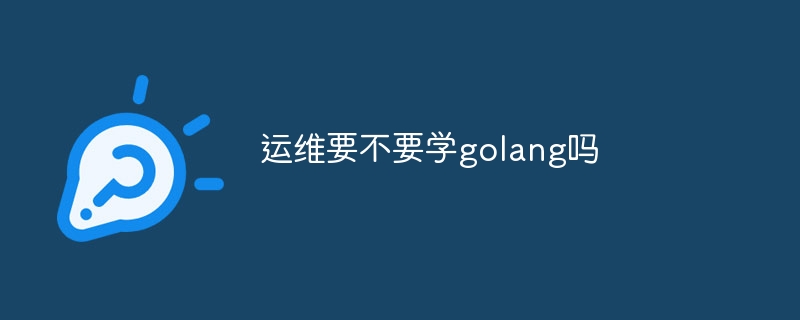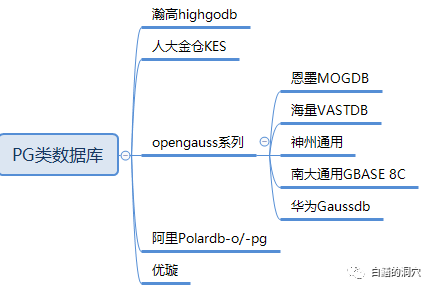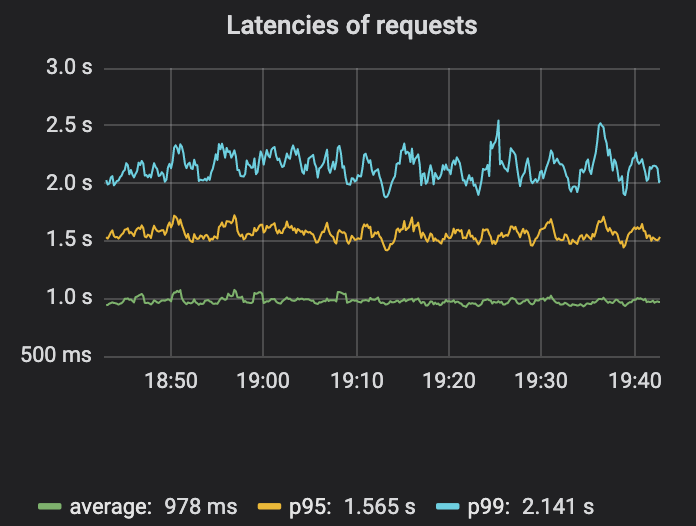 Backend Development
Backend Development Golang
Golang The benefits of learning Golang for operation and maintenance personnel
The benefits of learning Golang for operation and maintenance personnel
The benefits of learning Golang for operation and maintenance personnel require specific code examples
In recent years, with the continuous development of Internet technology and the increasing importance of operation and maintenance work, for For operation and maintenance personnel, mastering multiple programming languages has become an essential skill. Among many programming languages, Golang, as an efficient and easy-to-use programming language, has many benefits for operation and maintenance personnel. This article will introduce the benefits of learning Golang for operation and maintenance personnel and provide specific code examples.
1. Advantages of concurrent programming in Golang
For operation and maintenance personnel, they often need to handle a large number of concurrent requests and thread management. As a language that inherently supports concurrent programming, Golang can greatly simplify the complexity of concurrent programming. By using Golang's goroutines and channels, operation and maintenance personnel can easily implement efficient concurrent programming and improve system performance and stability.
The following is a simple Golang concurrent programming example to simulate processing multiple requests at the same time:
package main
import (
"fmt"
"time"
)
func worker(id int, jobs <-chan int, results chan<- int) {
for j := range jobs {
fmt.Printf("Worker %d processing job %d
", id, j)
time.Sleep(time.Second) // 模拟处理耗时
results <- j * 2
}
}
func main() {
jobs := make(chan int, 5)
results := make(chan int, 5)
for w := 1; w <= 3; w++ {
go worker(w, jobs, results)
}
for j := 1; j <= 5; j++ {
jobs <- j
}
close(jobs)
for a := 1; a <= 5; a++ {
<-results
}
}In this example, we created 3 worker goroutines to process 5 tasks concurrently . Each worker will obtain tasks from the jobs channel, process them, and then send the results to the results channel. Finally, we obtain the processing results of all tasks through the results channel.
2. Golang’s performance advantages
In addition to the advantages of concurrent programming, Golang is also known for its excellent performance. For operation and maintenance personnel, efficient programming languages can increase the speed of code execution, reduce the consumption of system resources, and thus improve the overall performance of the system. Golang's static typing and compilation optimization features give it obvious advantages in performance.
The following is a simple Golang performance test example, comparing the performance difference between Golang and Python when calculating Fibonacci sequence:
package main
import (
"fmt"
"time"
)
func fibonacci(n int) int {
if n <= 1 {
return n
}
return fibonacci(n-1) + fibonacci(n-2)
}
func main() {
start := time.Now()
for i := 0; i < 40; i++ {
fmt.Printf("fibonacci(%d) = %d
", i, fibonacci(i))
}
elapsed := time.Since(start)
fmt.Printf("Elapsed time: %s
", elapsed)
}As can be seen from this example, written in Golang The execution speed of the Fibonacci sequence calculation program far exceeds that of the Python program with the same function, demonstrating the performance advantages of Golang.
3. Golang’s cross-platform support
For operation and maintenance personnel, they often need to deploy and run programs on multiple operating systems, so cross-platform support is an important consideration. The cross-compilation function supported by Golang allows programs to run seamlessly under different operating systems, which greatly facilitates the work of operation and maintenance personnel.
The following is a simple Golang cross-platform example, showing how to use Golang to query operating system information:
package main
import (
"fmt"
"runtime"
)
func main() {
fmt.Printf("OS: %s
", runtime.GOOS)
fmt.Printf("Arch: %s
", runtime.GOARCH)
}Through this example, we can run the program under different operating systems and obtain the corresponding operating system information, demonstrating Golang’s advantages in cross-platform support.
Summary
Through the above introduction, we can see that the benefits of learning Golang for operation and maintenance personnel are mainly reflected in the advantages of concurrent programming, performance advantages and cross-platform support. Golang's concise and efficient syntax, powerful standard library and rich third-party libraries provide a lot of convenience for operation and maintenance personnel. Therefore, operation and maintenance personnel who learn to master Golang will be able to better cope with complex operation and maintenance work, improve work efficiency, and contribute to the development of the company.
The above is the detailed content of The benefits of learning Golang for operation and maintenance personnel. For more information, please follow other related articles on the PHP Chinese website!
 Spring Boot Actuator端点大揭秘:轻松监控你的应用程序Jun 09, 2023 pm 10:56 PM
Spring Boot Actuator端点大揭秘:轻松监控你的应用程序Jun 09, 2023 pm 10:56 PM一、SpringBootActuator端点简介1.1什么是Actuator端点SpringBootActuator是一个用于监控和管理SpringBoot应用程序的子项目。它提供了一系列内置的端点(Endpoints),这些端点可以用于查看应用程序的状态、运行情况和运行指标。Actuator端点可以以HTTP、JMX或其他形式暴露给外部系统,便于运维人员对应用程序进行监控、诊断和管理。1.2端点的作用和功能Actuator端点主要用于实现以下功能:提供应用程序的健康检查,包括数据库连接、缓存、
 运维工作十多年,无数个瞬间、我觉得自己还是个小白...Jun 09, 2023 pm 09:53 PM
运维工作十多年,无数个瞬间、我觉得自己还是个小白...Jun 09, 2023 pm 09:53 PM曾几何时,当我还是一名初出茅庐的计算机专业应届生的时候,在招聘网站上浏览了很多招聘贴,眼花缭乱的技术岗位让我摸不着头脑:研发工程师、运维工程师、测试工程师...大学期间专业课马马虎虎,更谈不上有什么技术视野,对于具体从事那个技术方向并没有什么明确的想法。直到一位学长对我说:“做运维吧,做运维不用天天写代码,会玩Liunx就行!比做开发轻松多了!”我选择了相信......入行十多年,吃过很多苦,背了很多锅,弄死过服务器,经历过部门裁员,如果有人现在跟我说做运维比开发简单,那我会
 Spring Cloud微服务架构部署与运维Jun 23, 2023 am 08:19 AM
Spring Cloud微服务架构部署与运维Jun 23, 2023 am 08:19 AM随着互联网的快速发展,企业级应用的复杂度日益增加。针对这种情况,微服务架构应运而生。它以模块化、独立部署、可扩展性高等特点,成为当今企业级应用开发的首选。作为一种优秀的微服务架构,SpringCloud在实际应用中展现出了极大的优势。本文将介绍SpringCloud微服务架构的部署与运维。一、部署SpringCloud微服务架构SpringCloud
 运维要不要学golang吗Jul 17, 2023 pm 01:27 PM
运维要不要学golang吗Jul 17, 2023 pm 01:27 PM运维不要学golang,其原因是:1、golang主要被用于开发高性能和并发性能要求较高的应用程序;2、运维工程师通常使用的工具和脚本语言已经能够满足大部分的管理和维护需求;3、学习golang需要一定的编程基础和经验;4、运维工程师的主要目标是确保系统的稳定和高可用性,而不是开发应用程序。
 PG数据库运维工具要覆盖哪些能力Jun 08, 2023 pm 06:56 PM
PG数据库运维工具要覆盖哪些能力Jun 08, 2023 pm 06:56 PM过节前我和PG中国社区合作搞了一个关于如何使用D-SMART来运维PG数据库的线上直播,正好我的一个金融行业的客户听了我的介绍,打电话过来聊了聊。他们正在做数据库信创的选型,也试用了多个国产数据库,最后他们准备选择TDSQL。当时我觉得有点意外,他们从2020年就开始在做国产数据库选型,不过好像最初使用TDSQL后的感受并不太好。后来经过沟通才了解到,他们刚开始使用TDSQL的分布式数据库,发现对研发要求太高,所以后来就全部选择TDSQL的集中式MYSQL实例,用下来发现挺好用的。整个数据库云
 途游邹轶:中小公司的运维怎么做?Jun 09, 2023 pm 01:56 PM
途游邹轶:中小公司的运维怎么做?Jun 09, 2023 pm 01:56 PM通过采访和约稿的方式,请运维领域老炮输出深刻洞见,共同碰撞,以期形成一些先进的共识,推动行业更好得前进。这一期我们邀请到的是邹轶,途游游戏运维总监,邹总经常戏称自己是世界500万强企业的运维代表,可见内心中是觉得中小公司的运维建设思路和大型企业是有差别的,今天我们带着几个问题,来请邹总分享一下他的中小公司研运一体化之路。这里是接地气、有高度的《运维百家讲坛》第6期,开讲!问题预览途游是游戏公司,您觉得游戏运维有哪些独特性?面临的最大运维挑战是什么?您又是如何解决这些挑战的?游戏运维的人
 什么是可观测性?初学者需要知道的一切Jun 08, 2023 pm 02:42 PM
什么是可观测性?初学者需要知道的一切Jun 08, 2023 pm 02:42 PM可观测性一词来源于工程领域,近年来在软件开发领域也日益流行。简而言之,可观测性是指根据外部输出以了解系统内部状态的能力。IBM对可观测性的定义为:通常,可观测性是指基于对复杂系统外部输出的了解就能够了解其内部状态或状况的程度。系统越可观测,定位性能问题根本原因的过程就能越快速且准确,而无需进行额外的测试或编码。在云计算中,可观测性还指对分布式应用系统及支撑其运行的基础设施的数据进行聚合、关联和分析的软件工具和实践,以便对应用系统进行更有效地监控、故障排除和调试,从而实现客户体验优化、服务水平协议
 Uber实践:运维大型分布式系统的一些心得Jun 09, 2023 pm 04:53 PM
Uber实践:运维大型分布式系统的一些心得Jun 09, 2023 pm 04:53 PM本文是Uber的工程师GergelyOrosz的文章,原文地址在:https://blog.pragmaticengineer.com/operating-a-high-scale-distributed-system/在过去的几年里,我一直在构建和运营一个大型分布式系统:优步的支付系统。在此期间,我学到了很多关于分布式架构概念的知识,并亲眼目睹了高负载和高可用性系统运行的挑战(一个系统远远不是开发完了就完了,线上运行的挑战实际更大)。构建系统本身是一项有趣的工作。规划系统如何处理10x/100


Hot AI Tools

Undresser.AI Undress
AI-powered app for creating realistic nude photos

AI Clothes Remover
Online AI tool for removing clothes from photos.

Undress AI Tool
Undress images for free

Clothoff.io
AI clothes remover

AI Hentai Generator
Generate AI Hentai for free.

Hot Article

Hot Tools

mPDF
mPDF is a PHP library that can generate PDF files from UTF-8 encoded HTML. The original author, Ian Back, wrote mPDF to output PDF files "on the fly" from his website and handle different languages. It is slower than original scripts like HTML2FPDF and produces larger files when using Unicode fonts, but supports CSS styles etc. and has a lot of enhancements. Supports almost all languages, including RTL (Arabic and Hebrew) and CJK (Chinese, Japanese and Korean). Supports nested block-level elements (such as P, DIV),

ZendStudio 13.5.1 Mac
Powerful PHP integrated development environment

Zend Studio 13.0.1
Powerful PHP integrated development environment

SublimeText3 Chinese version
Chinese version, very easy to use

Safe Exam Browser
Safe Exam Browser is a secure browser environment for taking online exams securely. This software turns any computer into a secure workstation. It controls access to any utility and prevents students from using unauthorized resources.





